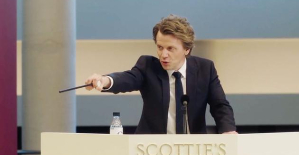Showing the desire to “make work pay better”, Élisabeth Borne on Monday threatened branches with minimum wages below the minimum wage to lower their exemptions if there is no progress by June, closing a social conference with the social partners.
Welcoming a “useful” moment of consultation, the Prime Minister indicated that the Ministry of Labor would “soon receive all branches with minimums below the minimum wage so that they can explain their delay”. “If we do not see significant progress by June 1, 2024, the government will propose to Parliament a text of law which will allow exemptions to be calculated not on the basis of the minimum wage, but on the basis of the branch minimum,” she said.
Currently, 56 branches are not in compliance and around ten are “structurally”, according to the Minister of Labor Olivier Dussopt. This does not mean, however, that employees are paid below the minimum wage - the employer must make up the gap - but when several levels of seniority are caught up by the minimum wage, this generates a “flattening” of salaries.
Élisabeth Borne also proposed to the social partners to “build a new index” on gender equality, the current barometer being “perfectible” and announced a mission entrusted to experts on exemptions from social contributions. The Prime Minister also confirmed the creation of a High Council for Remuneration, which will focus in particular on part-time work and short contracts.
Also read Salaries: why the scales of certain branches start below the minimum wage
The union organizations (CFDT, CGT, FO, CFTC, CFE-CGC, Solidaires and Unsa) and employers (Medef, U2P, CPME, FNSEA, Fesac and Udes) were gathered for this high mass all day long at the Economic and Social Council and environmental (Cese) in the presence of several ministers. “We find ourselves today with the desire that work pays better and to relaunch social advancement,” the Prime Minister underlined at the opening, after a minute of silence in tribute to Dominique Bernard, the teacher killed in a attack on Friday in Arras.
“It is the negotiation which will lead to the revision of the classification grids” and “which will change the minimum salaries of the branches which are still below the minimum wage”, she clarified, even if “of course, the State will take all His part". If the unions welcomed the fact that the question of wages was “finally” on the menu of discussions, they expected something “concrete”.
“While inflation makes the ends of the month more difficult for many, purchasing power (...) is the number one concern of the French,” insisted the general secretary of the CFDT Marylise Léon, while her counterpart of the CGT Sophie Binet highlighted the “need for this day to be productive”. “For the workers, we do not give alms, and it is with the salary that we fill the fridge,” launched Frédéric Souillot (FO).
The Minister of Labor Olivier Dussopt then underlined that “the State cannot be alone at the crossroads of expectations and demands”, while the Minister of the Economy listed several “dead ends” including the indexation of salaries to the inflation, demanded in particular by the CGT and FO. Bruno Le Maire mentioned different “areas of work”, such as the need to “boost productivity” or improve gender equality.
After these interventions, the unions were skeptical. “There’s no point in having us come for a day of social conference dedicated to salaries if we don’t talk about salaries,” said Sophie Binet. “I have doubts about the fact that we can deal with things when we have visions” based on “statistics, Excel spreadsheets and curves”, added Marylise Léon, while for François Hommeril (CFE-CGC) “ Bruno the Mayor is very strong, he closed all the doors.”
The social conference takes place three days after a half-hearted demonstration to defend purchasing power, which brought together between 92,500 and some 200,000 people in France. The downside is that it took place against a backdrop of deep disagreement between the social partners and the government over the finances of the private supplementary pension schemes (Agirc-Arrco) and unemployment insurance (Unedic). “There was never any question of taking money from them,” defended Élisabeth Borne, wishing however to “protect” the savings made in supplementary plans thanks to the pension reform.

 Germany: the trial of nine “Citizens of the Reich” conspirators begins this Monday
Germany: the trial of nine “Citizens of the Reich” conspirators begins this Monday United Kingdom: David Cameron under fire after renting a jet estimated at 42 million pounds
United Kingdom: David Cameron under fire after renting a jet estimated at 42 million pounds Pro-Palestinian demonstrations at Sciences Po: why the red hands symbol is controversial
Pro-Palestinian demonstrations at Sciences Po: why the red hands symbol is controversial Nigeria: between stigmatization and rejection, the difficult daily life of ex-hostages rescued from Boko Haram
Nigeria: between stigmatization and rejection, the difficult daily life of ex-hostages rescued from Boko Haram Sánchez cancels his agenda and considers resigning: "I need to stop and reflect"
Sánchez cancels his agenda and considers resigning: "I need to stop and reflect" The Federal Committee of the PSOE interrupts the event to take to the streets with the militants
The Federal Committee of the PSOE interrupts the event to take to the streets with the militants Repsol: "We want to lead generative AI to guarantee its benefits and avoid risks"
Repsol: "We want to lead generative AI to guarantee its benefits and avoid risks" Osteoarthritis: an innovation to improve its management
Osteoarthritis: an innovation to improve its management Agriculture: Emmanuel Macron will receive the unions at the Élysée on May 2
Agriculture: Emmanuel Macron will receive the unions at the Élysée on May 2 In the North, this city that no one wants to protect since the riots
In the North, this city that no one wants to protect since the riots Vueling: strike of hostesses and stewards for the Ascension Bridge
Vueling: strike of hostesses and stewards for the Ascension Bridge A 13-year-old English boy finds a small Lego octopus that has been adrift for 27 years
A 13-year-old English boy finds a small Lego octopus that has been adrift for 27 years Royal Enfield Shotgun, 'custom' attitude from Monday to Sunday
Royal Enfield Shotgun, 'custom' attitude from Monday to Sunday End of the legal battle between Britney Spears and her father
End of the legal battle between Britney Spears and her father The Fall Guy with Ryan Gosling, the funnier the fall
The Fall Guy with Ryan Gosling, the funnier the fall The Stolen Painting: Great Art
The Stolen Painting: Great Art Omoda 7, another Chinese car that could be manufactured in Spain
Omoda 7, another Chinese car that could be manufactured in Spain BYD chooses CA Auto Bank as financial partner in Spain
BYD chooses CA Auto Bank as financial partner in Spain Tesla and Baidu sign key agreement to boost development of autonomous driving
Tesla and Baidu sign key agreement to boost development of autonomous driving Skoda Kodiaq 2024: a 'beast' plug-in hybrid SUV
Skoda Kodiaq 2024: a 'beast' plug-in hybrid SUV The home mortgage firm rises 3.8% in February and the average interest moderates to 3.33%
The home mortgage firm rises 3.8% in February and the average interest moderates to 3.33% This is how housing prices have changed in Spain in the last decade
This is how housing prices have changed in Spain in the last decade The home mortgage firm drops 10% in January and interest soars to 3.46%
The home mortgage firm drops 10% in January and interest soars to 3.46% The jewel of the Rocío de Nagüeles urbanization: a dream villa in Marbella
The jewel of the Rocío de Nagüeles urbanization: a dream villa in Marbella Europeans: a senior official on the National Rally list
Europeans: a senior official on the National Rally list Blockade of Sciences Po: the right denounces a “drift”, the government charges the rebels
Blockade of Sciences Po: the right denounces a “drift”, the government charges the rebels Even on a mission for NATO, the Charles-de-Gaulle remains under French control, Lecornu responds to Mélenchon
Even on a mission for NATO, the Charles-de-Gaulle remains under French control, Lecornu responds to Mélenchon “Deadly Europe”, “economic decline”, immigration… What to remember from Emmanuel Macron’s speech at the Sorbonne
“Deadly Europe”, “economic decline”, immigration… What to remember from Emmanuel Macron’s speech at the Sorbonne These French cities that will boycott the World Cup in Qatar
These French cities that will boycott the World Cup in Qatar Roborock launches in Spain two new robot vacuum cleaners: S8 MaxV Ultra and Qrevo Pro
Roborock launches in Spain two new robot vacuum cleaners: S8 MaxV Ultra and Qrevo Pro Oppo Reno 11 F 5G: We tested the mid-range mobile with which Oppo returns to Europe
Oppo Reno 11 F 5G: We tested the mid-range mobile with which Oppo returns to Europe These are the phones that already boast generative AI
These are the phones that already boast generative AI Bayern Munich-Real Madrid: two immortals of the Champions League with different trajectories
Bayern Munich-Real Madrid: two immortals of the Champions League with different trajectories

















